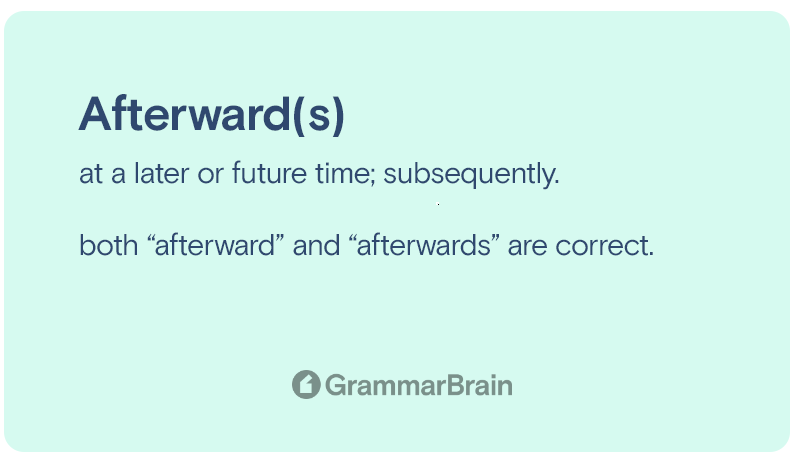Is it afterward or afterwards? Spoken English can be confusing sometimes based on the person, place, and context. There is a lot of debate on many verbal and written words that stir up arguments. Today we discuss similar confusion on which word is correct: Afterwards or Afterward.
The difference between afterward and afterword:
Before we begin exploring the aspects of afterward and afterwards, let’s get this out in the air. Afterward and Afterword are two completely different things. Fundamentally, an Afterword refers to a paragraph or a write-up written at the end of the book.
To be more clear, an afterword concludes the book or a novel written in the third person (not the author) as a good spirit. Afterward and afterword are two unrelated things in terms of their meanings and use.
An example of an afterword: My book is currently under print, and the publication is planning for a new afterword.
What is the meaning of afterwards?
To begin with, “afterwards” is a directional adverb used in spoken English to dictate a time.
Ex 1: Tom left the party shortly afterwards.
Ex 2: He was arrested long afterwards.
Ex 2: Let’s go to the movie now and eat afterwards.
Here we bring a conclusive answer to which is the right word to use. Because we hate to delay things afterwards.
| Word | Definition |
| Afterwards | at a later or future time; subsequently. |
| Afterward | at a later or future time; subsequently. |
Differences in the US & UK English use
To begin with, there are absolutely no differences between the words. “Afterward” and “Afterwards” mean the same in terms of the meaning they convey.
Both the words do not profess any differences in meanings as they both indicate events in time. The Merriam-Webster, AP Style, and Oxford Dictionary all suggest the same meaning.
The only difference is American English commonly refers to afterward while UK and Canadian English use Afterwards.

How to use Afterward?
Afterward is simply a synonym for the word later. Here are some clear examples of how to use afterward.
Example: Sara and Alex had dinner and went to the movie afterward.
Example: I would like to read the book now, and I will watch the movie afterward.
Example: Afterward, my father went out to buy us some candy.
How to use Afterwards?
As mentioned before, afterwards carries the same meaning as afterward. There is no difference in the meaning and the context irrespective of its use.
Example: Afterwards she regretted what she said.
Example: I am planning to go to Starbucks afterwards.
Example: It crosses my mind afterwards that seven is too late so I preponed it.
What is the most commonly used adverb: Afterward or Afterwards?
If you are still hesitant about what to use, then go for Afterwards. The use of afterwards is the most commonly used word when compared with afterward in British English.
The use of “afterwards” is rapid in talking comparatively. However, it is safe to use “afterward” when you are writing a piece as it appears more professional and precise.
Since everything’s been cleared out as to which afterward to use, we wish you a great day without having to delay the wishes for afterwards.
Conclusion:
Afterward/Afterwards are clear adverbs placed before or after a verb to suggest a time variation. It is the most common synonym for the word later.
However, it is essential to understand that afterword is a completely different noun with different naming.
The easy way to identify the difference between afterward and the afterword is the word O.
Now that you are clear on how to use afterward and afterwards, make sure to implement them in your day-to-day routine for more accuracy.
Inside this article
Fact checked:
Content is rigorously reviewed by a team of qualified and experienced fact checkers. Fact checkers review articles for factual accuracy, relevance, and timeliness. Learn more.
Core lessons
Glossary
- Abstract Noun
- Accusative Case
- Anecdote
- Antonym
- Active Sentence
- Adverb
- Adjective
- Allegory
- Alliteration
- Adjective Clause
- Adjective Phrase
- Ampersand
- Anastrophe
- Adverbial Clause
- Appositive Phrase
- Clause
- Compound Adjective
- Complex Sentence
- Compound Words
- Compound Predicate
- Common Noun
- Comparative Adjective
- Comparative and Superlative
- Compound Noun
- Compound Subject
- Compound Sentence
- Copular Verb
- Collective Noun
- Colloquialism
- Conciseness
- Consonance
- Conditional
- Concrete Noun
- Conjunction
- Conjugation
- Conditional Sentence
- Comma Splice
- Correlative Conjunction
- Coordinating Conjunction
- Coordinate Adjective
- Cumulative Adjective
- Dative Case
- Determiner
- Declarative Sentence
- Declarative Statement
- Direct Object Pronoun
- Direct Object
- Diction
- Diphthong
- Dangling Modifier
- Demonstrative Pronoun
- Demonstrative Adjective
- Direct Characterization
- Definite Article
- Doublespeak
- False Dilemma Fallacy
- Future Perfect Progressive
- Future Simple
- Future Perfect Continuous
- Future Perfect
- First Conditional
- Irregular Adjective
- Irregular Verb
- Imperative Sentence
- Indefinite Article
- Intransitive Verb
- Introductory Phrase
- Indefinite Pronoun
- Indirect Characterization
- Interrogative Sentence
- Intensive Pronoun
- Inanimate Object
- Indefinite Tense
- Infinitive Phrase
- Interjection
- Intensifier
- Infinitive
- Indicative Mood
- Participle
- Parallelism
- Prepositional Phrase
- Past Simple Tense
- Past Continuous Tense
- Past Perfect Tense
- Past Progressive Tense
- Present Simple Tense
- Present Perfect Tense
- Personal Pronoun
- Personification
- Persuasive Writing
- Parallel Structure
- Phrasal Verb
- Predicate Adjective
- Predicate Nominative
- Phonetic Language
- Plural Noun
- Punctuation
- Punctuation Marks
- Preposition
- Preposition of Place
- Parts of Speech
- Possessive Adjective
- Possessive Determiner
- Possessive Case
- Possessive Noun
- Proper Adjective
- Proper Noun
- Present Participle
- Prefix
- Predicate



